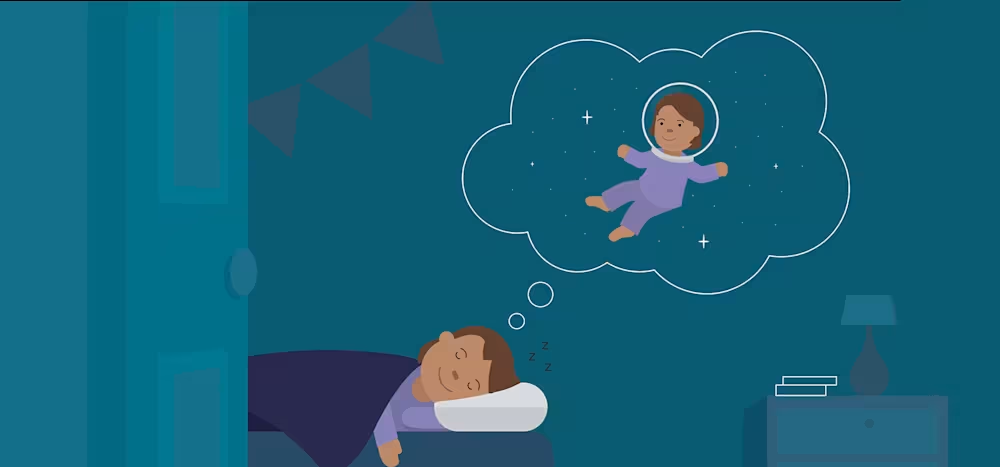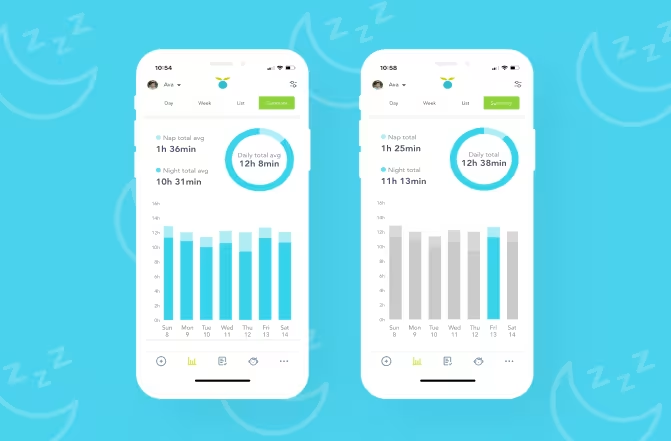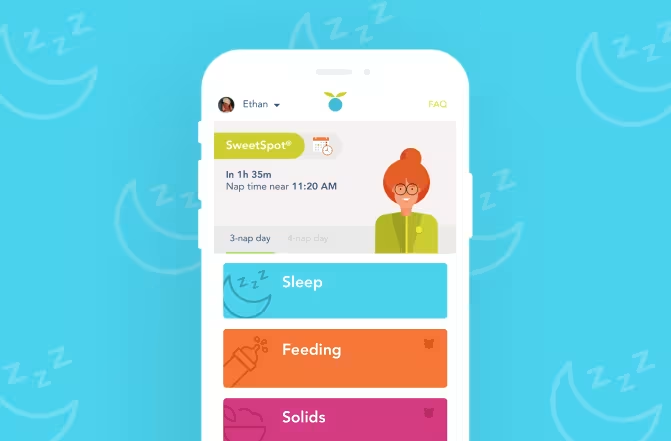Improving infant sleep may better parents' mental health
Updated Oct 02, 2025

Sleep is inextricably linked with mental health. By now, this is probably obvious. What may not be as clear is how a parent’s mental health correlates with the quality of their child’s sleep.
If we can improve a child’s sleep, can that help decrease stress, anxiety, and depression in parents?
How sleep impacts the whole family
In recognition of National Depression and Mental Health Screening Month, Huckleberry is releasing the results of a study that examines how a scalable, app-based sleep intervention can impact infant sleep and parental mental health, specifically in a population with low income. The study is part of the Harvard Center on the Developing Child’s Scaling Impact Portfolio.
“Of course sleep is important, but we want to see how that extends beyond sleep for the child, to how it impacts the whole family and especially mothers,” says Huckleberry CEO Jessica Toh.
We found that when sleep challenges were tackled head-on by following a customized sleep plan for their children, parents saw improvements in their own overall mental health.
Of the 79 participating families, recruited from Huckleberry’s account holder database, 93% of participants who implemented at least some of their sleep plan reported an improvement in their child’s sleep. In addition:
7 out of 9 (77.78%) participants who began with a non-normal level of depression moved into the normal range.
8 out of 9 (88.89%) participants who began with a non-normal level of anxiety moved into the normal range.
7 out of 8 (87.5%) participants who began with a non-normal level of stress moved into the normal range.
Modeling a 2016 Australian study [], we used the Depression Anxiety Stress Scale 21 (DASS21) questionnaire to examine the levels of depression, anxiety, and stress among parents with low income before and after they received our app-based sleep intervention.
It is common for new parents to experience spikes in stress. Families with low income are at particularly high risk for developing sleep-related problems, and in turn, experiencing the negative effects associated with poor sleep due to excessive stress in their environment [].
“Accessibility is very important to us,” says Toh. An app-based approach could be key for families who don’t have adequate time or financial resources for a clinical sleep improvement program.

The social impact of sleep deprivation
Besides feeling sluggish and foggy, sleep deprivation can exacerbate the struggles many new parents already face. And chronic sleep loss can lead to mental illnesses such as depression and anxiety.
New parents often report feeling isolated from previous engagements and social circles after their baby is born. Mothers face particular risk. They may experience loneliness due to physical recovery, frequent breastfeeding, longer parental leave, and other factors. Lack of sleep can worsen depression symptoms in mothers with postpartum depression []. In the first three months after the birth of a child, mothers lost an average 62 minutes of sleep per night, whereas fathers lost only 13 minutes, according to one study [].
Recognize the signs
Whether you’re losing sleep due to your child’s nighttime wakeups or experiencing insomnia due to stress or anxiety, there are a few common areas to watch for symptoms of sleep deprivation.
Physical health: Feeling sluggish, slow, physically weak, or experiencing weakened immunity to infection.
Cognitive health: Slower thinking or reaction time, reduced attention span, or worsening memory.
Mental health: Mood changes, such as elevated stress, anxiety, ruminating, irritability, impulsiveness, or depression.

Baby sleep tips for parents
Here are some steps and good rules of thumb for improving your baby’s sleep:
Establish a bedtime routine
Babies need repetition of sleep associations for optimal sleep. Start the same each night before bed to cue them in. A simple routine could be milk, bath, pajamas, book, crib.
Stabilize their circadian rhythm
Circadian rhythms follow a 24-hour cycle and revolve around light and dark, day and night. But babies are not born with these rhythms. Help establish that night is for sleep by lowering shades and turning off lights during times of rest, and brightening and energizing the home when it’s time to wake.
Create a conducive sleep environment
Besides dimming light, keep your baby’s room cool and free of distractions, such as brightly colored mobiles or night lights. Surroundings are important to attain a rested baseline.
Gauge their hunger
Some babies aren’t able to sleep through the night without getting hungry. If they’re exclusively bottle or breastfeeding, they may still need those night feedings. If they’ve started eating solids, offer a higher protein item before bedtime or push dinner time a bit later.
Go with your gut
No two babies are alike. If something isn’t working, make a safe adjustment, for instance, setting an earlier or later bedtime according to their individual rhythm.
Self-care tips for parents
Too often we stop at what baby needs. Remember to prioritize your own rest and mental health as a parent.
Ask for and accept help
Take advantage of visitors, family, friends, and babysitters. No need to host or entertain your guests. Ask them to hold or play with your baby while you shower, rest, or get some sleep.
Set clear expectations
If you have a partner or share regular caretaking duties with another family member, get on the same page with them. Set up a system for nighttime wakings where you take turns, work in shifts, alternate nap duties, or take turns sleeping in on the weekend.
Seek professional guidance
Parents are expected to feel heightened stress and anxiety. This is very common and you are not alone. Talking about these feelings helps alleviate your burden. Speak to your healthcare provider if you are experiencing symptoms of anxiety or stress. You can also call the (SAMHSA) National Helpline at 1-800-662-HELP for support or information about care near you.

Accessing peace as a family
It’s easy to believe that our children’s needs come first. Sometimes that’s true. But in general, we’re better parents to our kids when we focus on our own health too.
While stress, anxiety, and feelings of depression are common among new parents, it can be difficult to identify them, much less pinpoint where they might be coming from. Fortunately, sleep is a common thread when it comes to mental and physical health. So it makes sense to nurture our rest and, by extension, our family’s rest as well.
Studies like this help us learn more about the importance of sleep for improving mental health in accessible ways. Huckleberry is committed to helping make health and wellness more accessible for every family. Since launching, we have provided over 4,000 subscriptions to families who did not have the means to pay for the app on their own. We also launched a pay-what-you-can program in 2021 to help families mentally and financially impacted by the pandemic receive access to specialized data that they may not be able to attain otherwise.
If you’d like to explore how Huckleberry can help you and your family, .
Share article:
Note: The content on this site is for informational purposes only and should not replace medical advice from your doctor, pediatrician, or medical professional. If you have questions or concerns, you should contact a medical professional.
4 Sources
Share article:








